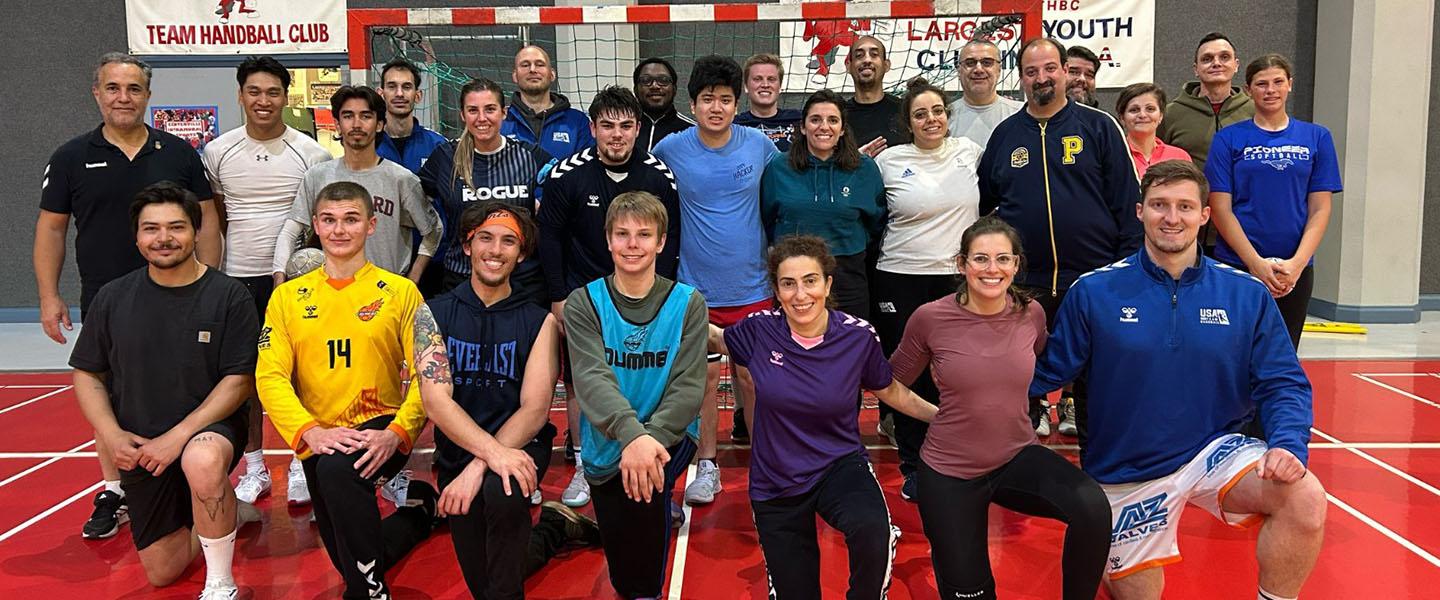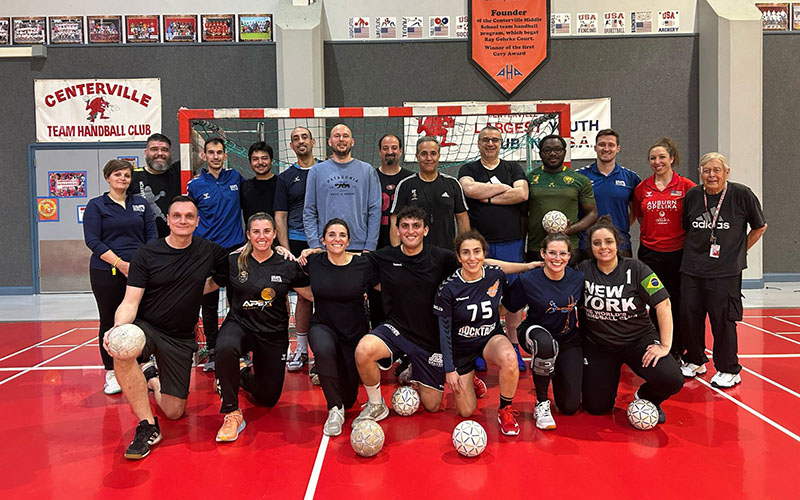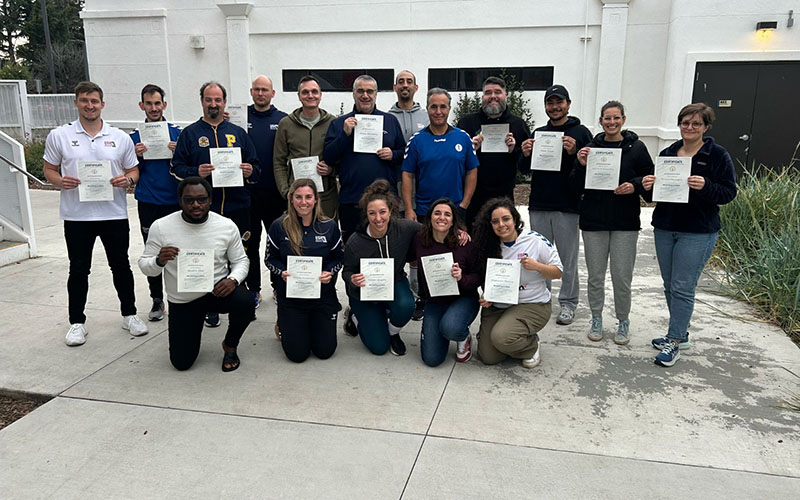“A major milestone for USA Team Handball” – participants reflect on historic IHF Coaching License course in the USA
11 Jul. 2025

Last March the IHF, in partnership with USA Team Handball (USATH), delivered the first-ever IHF Coaching License Course in the United States of America (USA), when it held an ‘IHF D License’ course at Centerville Middle School, San Francisco.
A variety of people, including coaches from various levels of the USA national teams, club teams, and physical education teachers participated, led by IHF Commission of Coaching and Methods (CCM) Lecturer, Alireza Habibi.
The course covered a wide variety of handball and sport science classroom and practical sessions from intermediate to advanced level.
These included tactical and technical elements of handball, talent identification in handball, principles of training and periodisation of strength training for youth and junior handball players, sport psychology and leadership skills for handball coaches and trends in modern handball, warm ups, small games, tactics and a lot more before ending with a final, written exam which saw all participants pass and successfully gain their IHF D License.
IHF.info speaks to two of the participants on the course, Liz Hartnett (Elizabeth Hartnett Wyatt) and Martin Biello, about their experiences on the historic course.
ihf.info: Tell us about your background and handball experience…
Liz Hartnett (LH): I currently live in southern California and have been a US national team player for 11 years both in the indoor and beach disciplines.
Most recently, I played at the 2025 North American and Caribbean Championship (NACHC) in April and was assistant coach with the junior side at the same event.
I have also just been selected for the US team for the upcoming Stage 2 of the 2025 IHF Beach Handball Global Tour
I am also the Athlete Representative on the USATH's Commission of Coaching and Methodology (CCM) and started a handball club ‘Apex Pro Sports’ in Irvine, Orange County, California earlier this year.
Martin Biello (MB): I am a former handball player who played my entire youth career back in Argentina. When I moved to the US in 2008, I got involved in the coaching and organisational side of things.
Since 2016 we have been running the only Youth Handball League in the US and since 2022 I've been the Head Coach for the U19 men’s national team. I also coached the U18 men's beach handball national team at the 2022 IHF Men’s Beach Handball Youth World Championships in Greece.
I currently live in San Jose, California and my main source of income is my work as an Adjunct Faculty at the University of Silicon Valley. In addition to that, I'm currently the Head Coach for Castillero, John Muir and River Glen Middle Schools, Pioneer High School, San José State University, and USATH's U19 and U17 men's national teams.
I'm also the co-chair of USATH's Commission of Coaching and Methodology (CCM), and a member of the NACHC's Coaching and Methods Commission.
IHF.info: What were the reasons for you signing up to the course?
LH: I chose to do the course because this is the first time a course like this has been offered in the USA since I have been involved in the sport, plus I also wanted to support the USATH CCM that I am a member of.
I am life-long learner and wanted to further my education of handball and how to teach handball at the introductory level. Additionally, I started my own club in southern California and I coach one of the practices each week.
MB: It is imperative that we develop knowledgeable coaches in the US to be able to develop the future generations of handball players. For years now, the structure for handball coach education in the US has been non-existent, so the CCM started working on developing it.
When the IHF, through the NACHC, approached us to offer the IHF D License course, we jumped on the opportunity to have it here, and to start developing our coaches with an international level curriculum and certification, not to mention getting our national team coaches started on their certification paths for international competition, myself included.

IHF.info: Leading on from that, why was it so important to have this course in the US?
MB: I cannot overstate how important this was, not only for the US, but for the region as a whole. We are, most likely, one of the least-developed regions in terms of coaching education, so to have these opportunities come here will improve our ecosystem tremendously and kick-off a new wave of handball enthusiasts that will bring more people into the sport.
It is extremely important that this continues over time and with regular events.
LH: It was a major milestone for USA Team Handball, and the efforts of the CCM, to bring this course to the United States. The only way we can grow the sport in the USA is by educating more coaches and referees and I hope this course is one of many.
IHF.info: What are your thoughts on the course itself?
MB: It was a good mix of men and women who came from all over the country, not just from the west coast, where the course was held. We had representation from several different clubs, and, of course, the national teams.
It was a great experience for everyone involved and we plan to keep doing them regularly in different parts of the country to get as many interested coaches the knowledge and certification to progress their careers.
For the more experienced coaches, it was a good experience to validate their learnings and display their skills, while for the newcomers, it was the perfect avenue to hone their skills and acquire the knowledge and tools to put it all into practice. It was good to see new examples and drills for developing skills that we have known from our playing and coaching days.
We all benefited from Alireza’s long experience – not only as a coach, but in delivering these kinds of courses – and were able to get feedback and suggestions on how to better structure our practices and coaching sessions.
It is no secret to say that the group enjoyed the time when we had kids and players to coach more than when we were ourselves the ones participating in the drills.

IHF.info: As someone experienced in beach handball, was there anything you could bring from this ‘indoor’, seven-a-side course into beach handball or anything from beach handball that you brought into the course?
MB: Of course. Everything that has to do with basic handball technique is adaptable; passing and catching, shooting, positioning, goalkeeping. All of that is essential for both disciplines, not to mention the sportsmanship and culture of handball.
My experience of beach handball also gave another perspective, especially when talking about how to play defence without contact, and how to teach the kids how to play handball with modified rules.
IHF.info: Any thoughts on how the course could be improved in the future?
LH: I liked the combination of the theory in the classroom and in person gymnasium instruction. However, the course could allow for a hybrid option which could help grow the sport here in the United States. All of our coaches in the United States are volunteers who work in other professions, therefore those that attended either had the ability to work remote, or had to take time off from work in order to attend the midweek course. Additionally, expenses for travel and accommodations can get costly for a week-long course.
If the D license course could be modified for a hybrid model, it could keep costs low for everyone attending. This would allow for more coaches to attend and help USA get more licensed coaches.
Since our country is so large, cross-country flights can be expensive. It was amazing to see we had attendees from Detroit, Miami, New York, Alabama, etc. A future option could be regional course locations around the country to allow the course to be more accessible to more people, which would mean we would have more handball coaches throughout the United States.
We are grateful to the USA Team Handball Foundation that covered the costs of the classroom and court rental in order to make this first ever IHF D License course possible.
IHF.info: Now you have the D license, what’s next for you? What does it allow you to do?
MB: First of all, it gives us the certification that we have the knowledge to be able to coach kids anywhere in the world. It also gives us a new baseline for coaches in the US to achieve.
And for those that want to continue progressing in their coaching education, it gives us the level necessary to pursue a C License when the opportunity arises.
Handball and how it is coached always evolves, so seeing it first hand and having it explained with detailed instruction, brings new life and meaning to old habits that perhaps we never stopped to analyse. It will definitely affect how we will deliver our Mini Handball classes and coaching moving forward.
LH: The course gave me the confidence I needed to lead a practice.
I actually have had the honour of assisting head coach Thomas (Baeckmann) with the junior women’s national team at the recent NACHC championships where we went undefeated and qualified for the Junior Pan American Games. Additionally, I will be attending the upcoming IHF Trophy and Junior Pan American Games as his assistant coach.
For more information on IHF coaching courses, please visit the IHF Education Centre.

